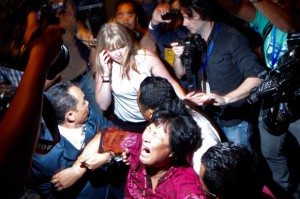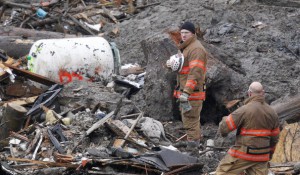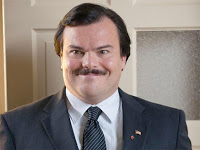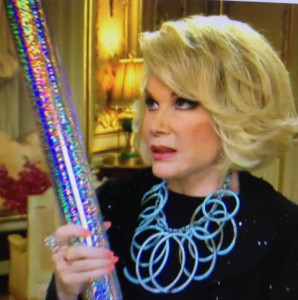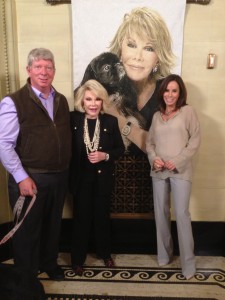Talking about death and what kind of arrangements need to be made at the end of your life isn’t an easy conversation for anyone. Many people don’t know how to discuss their wishes with their family because it makes them uncomfortable, and then when the individual becomes medically unable to make his or her wishes known, family members are left to handle a number of difficult decisions. As a result, this makes those choices twice as hard. If you’re looking for ways to have this discussion with your family in way that will open up the conversation in a positive manner, then The Conversation Project can help. This project is committed to helping individuals talk about the end of their lives and their wishes concerning hospice, medical care, and other end-of-life decisions so that their families aren’t left to make the choices on their own and so that they can celebrate the life of their loved one instead of feeling overwhelmed. A well planned funeral is one of the greatest gifts you can give.
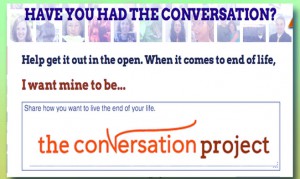 About The Conversation Project
About The Conversation Project
The Conversation Project is the brainchild of Ellen Goodman, whose own experience with caring for her mother at the end of her life and the challenges she faced spurred her into discussing the subject with friends, colleagues, and even doctors and clergymen. Goodman found herself overwhelmed with medical decisions when her mother could no longer make them, and after talking with others who’d had the same experience, Goodman and those like her launched The Conversation Project in 2010. The goal of the Conversation Project is to help people talk to their families about the end of their lives, the decisions they need to make concerning the care they receive, and how to honor those wishes so that they can be carried out when the time comes. So many people are aware of what they want to happen as they get older and are no longer to care for or make decisions for themselves, but sadly, they never discuss it with those closest to them because the subjects of death and dying are so difficult to broach. It is the ultimate goal of The Conversation Project to shed light on this issue and help people see that the best time to discuss these topics is before people become unable to, not after.
Presently, The Conversation Project works with the Institute for Healthcare Improvement (IHI). The project began to work with IHI, a non-profit organization that is dedicated to better health care for individuals all over the world, in 2011. Along with a number of other committed professionals, The Conversation Project has already helped a number of people make this difficult subject easier for their loved ones, has brought them closer together through these conversations, and has allowed people to make arrangements for their aging loved ones so that the end of their lives can be peaceful instead of fraught with uncertainty and pain.
Why Are These Conversations Necessary?
While some individuals put funeral directives in their wills, very few people include directives concerning their desires if they should become unable to make decisions for themselves, and this is a conversation that everyone needs to have before it happens, not after. While this may make you and other people uncomfortable, consider what might happen if you should develop dementia, Alzheimer’s, or have a stroke that rendered you unable to make medical decisions for yourself. This would leave your children or your spouse to make these choices in your place, which may make them uneasy, guilty, or frightened about what you may have wanted. By having these talks early on, you can make your wishes known and what they need to do in the event of medical emergencies and the events that may follow. While many people talk about writing down about the type of care they want at the end of their lives, few people actually follow through. These conversations are more than just talking about what you want to happen after a medical emergency or if you want medical intervention: it’s a conversation about long-term care, your happiness as you reach the end of your life, and communicating your desires about funeral arrangements as well.
These Talks Can Ease Your Family’s Grief and Allow Them to Celebrate Your Life
 While it’s difficult to discuss what kind of decisions should be made for the end of your life, it’s even harder to talk about your wishes concerning your funeral, but The Conversation Project can help you learn about how to approach the topic with your loved ones. It could be that you have even tried to have this discussion with your family in the past but they were unwilling to talk about it. This is a common reaction, as talking about the death of a loved one with that person makes many people feel awkward and uncomfortable. However, there are many advantages to starting these conversations, especially if you and your children or spouse have any disagreements about your wishes. When these conversations happen and your wishes are made clear, your family members can celebrate your life in a more meaningful way instead of feeling guilty that they made the wrong choices. The Conversation Project can help you talk to your loved ones about how understanding your wishes can benefit them as well.
While it’s difficult to discuss what kind of decisions should be made for the end of your life, it’s even harder to talk about your wishes concerning your funeral, but The Conversation Project can help you learn about how to approach the topic with your loved ones. It could be that you have even tried to have this discussion with your family in the past but they were unwilling to talk about it. This is a common reaction, as talking about the death of a loved one with that person makes many people feel awkward and uncomfortable. However, there are many advantages to starting these conversations, especially if you and your children or spouse have any disagreements about your wishes. When these conversations happen and your wishes are made clear, your family members can celebrate your life in a more meaningful way instead of feeling guilty that they made the wrong choices. The Conversation Project can help you talk to your loved ones about how understanding your wishes can benefit them as well.
How The Conversation Project May Benefit Survivors
When people become incapacitated at the end of their life and their loved ones are forced to make decisions for them, such as whether they wished to pass away at home, wanted full-time medical care, or what type of medical procedures they wanted in order to prolong their lives, when that person dies, those who live on are usually not only grieving but burdened with grief as well. Some of the questions they often ask themselves after their loved one has died are:
- Did I carry out all of my loved one’s wishes while they were alive?
- Were they happy at the end of their life?
- Were they unhappy and simply couldn’t communicate it?
- Was there anything I could have done to make their passing easier?
- Are the final arrangements I made what they really wanted?
All of these questions can affect people emotionally and mentally long after their loved ones have passed, affecting their lives on a day-to-day basis and adding to the grief that they are already feeling over their loss. This is another way that The Conversation Project can help; by teaching you how to approach the topic of your final wishes with your family and getting together to put it in writing, those who live on will never have to wonder about whether the decisions they made on your behalf were the right ones.

Talking about what you want the most when it comes to your final arrangements will also help those who are left behind focus on carrying out those wishes with dignity instead of having to agonize over every choice they make because you never discussed them. Burial, cremation, and the location of the final interment or placement can be carried out without your family members squabbling over what they think you would have wanted.
Pass on Your Beliefs and Goals

Your family can’t carry out your end-of-life goals and wishes if they are not made aware of them. By using The Conversation Project’s Starter Kit, you can let your family know that discussing your wishes and how you want to live at the end of your life isn’t really such a frightening thing. In fact, it may ease their minds because in many cases, those with elderly parents are just as worried about these issues but don’t know how to discuss them either. By using the starter kit together, you and your family can get the conversation going about how you’d like to live out your final days, what kind of medical care you’d approve of if you were able to, and even where you’d like to be laid to rest and how. By talking these issues out beforehand, you might even discover that your loved ones are curious about your beliefs and why you have made these choices.
Make Your Wishes Known Today
Talking about how you’d like to live out your final days is never an easy conversation for anyone to have, but with The Conversation Project, you can open up a frank discussion about decisions that will have a great deal of impact on your life and the lives of your loved ones as you approach the end of your life. Weather you prefer cremation services or burial. urns or caskets, clergy or a celebrant, let your wishes be known. Having this talk today with those who are going to be making these decisions will not only ease any feelings of guilt or fear they might feel later on, but it will also give them peace of mind when they carry out those wishes. If you would like to learn more about how The Conversation Project can help you, log onto theconversationproject.org and download their free starter kit today or talk to your doctor about what’s most important to you when it comes to living your final years with dignity and happiness.
Join The Author Jeff Staab On Google Plus
Like him on Face Book HERE
Connect on LinkedIn www.linkedin.com/in/jeffstaab


